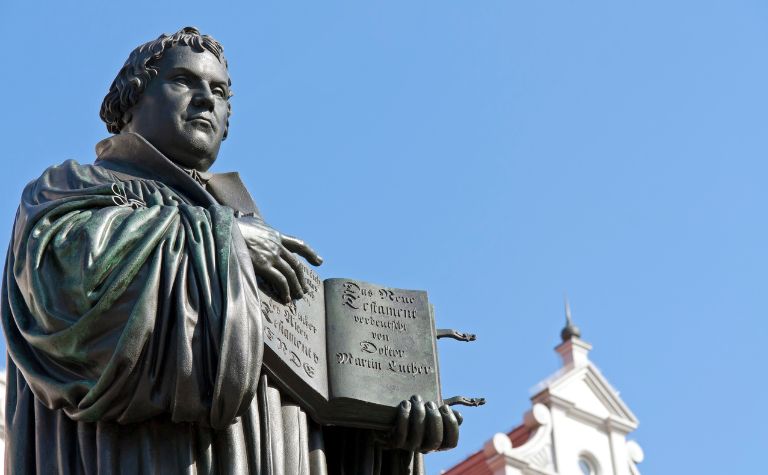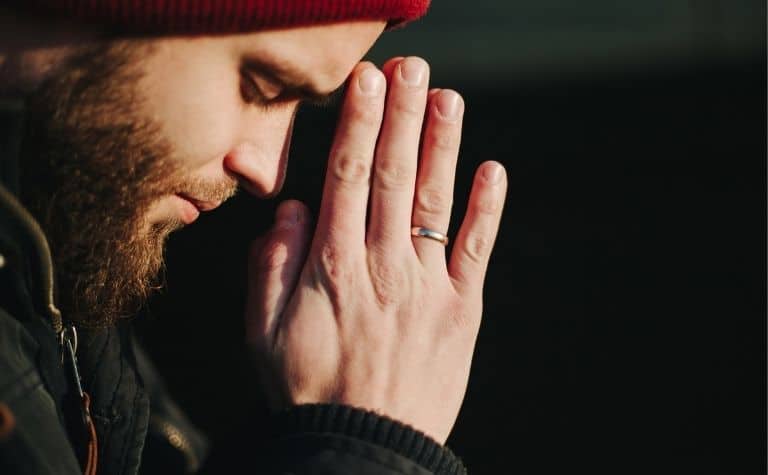Although Christians agree on many things concerning heaven and the reality of life after death, some issues remain unclear. For instance, various Christian traditions disagree on how living believers should interact with those who have died. In light of this, it is fair to ask: do Lutherans pray for the dead?
Lutheranism has historically allowed prayers for the dead in certain circumstances, like funeral services. However, the founder of Lutheranism, Martin Luther (1483-1546), permitted the practice only with precise boundaries and careful execution that made it biblical, unlike the Catholic approach.
How do Christians justify this practice biblically, and did Martin Luther partake in these prayers? Also, what is the specific teaching of modern Lutheran denominations? Keep reading to learn the answers to these questions and others.

What Does the Bible Teach About Praying For the Dead?
There are various lines of biblical arguments concerning this issue. The first defense of praying for the dead comes from an absence of evidence. The Bible, i.e., the 66 books that Protestants accept as canon, does not explicitly address praying for the dead.
Some argue that if the Bible does not strictly forbid an action, it exists within personal Christian freedom. For example, if a believer thinks God desires them to pray for a dead person, they are free to do so. (Also see What do Lutherans Believe About Mary?)
Proponents of praying for the dead sometimes also argue that the Bible withholds many details concerning the eternal state of believers. While Scripture teaches that God will judge all of the dead and that this judgment is final and irreversible, the exact timeline is not specific. Perhaps before judgment, prayers could benefit those who have died awaiting a sentence.
Did the Apostle Paul Pray For the Dead?
Some believers have carefully constructed an argument to pray for the dead from the New Testament letter 2 Timothy. Those who favor this line of reasoning argue that the letter’s wording implies that Onesiphorus, one of the people who Paul mentions in the letter, had died before he sent the epistle.
2 Timothy 1:16-18 reads, “May the Lord grant mercy to the household of Onesiphorus, for he often refreshed me and was not ashamed of my chains, but when he arrived in Rome he searched for me earnestly and found me— may the Lord grant him to find mercy from the Lord on that day!—and you well know all the service he rendered at Ephesus.” (ESV)
As the argument goes, Paul asked that the Lord grant Onesiphorus mercy on the day of judgment. If Onesiphorus were dead, it would imply both that Christians await judgment after death and that God permits people to pray for the dead in at least some circumstances. [1] (Also see Why Are Lutheran Churches Named After Saints?)

Did Martin Luther Encourage People to Pray For the Dead?
It is unclear whether Luther personally had a practice of praying for the dead. However, he cautiously supported other people doing so. Luther addressed this topic in a sermon that he gave in 1522. In this sermon, he outlines similar arguments as those above.
In particular, he stresses the difficulty of precisely knowing the state of someone’s soul once they have died. (Also see Do Lutherans Believe in Predestination?)
Luther said, “We know for certain from the Gospels that many dead people have been raised, and we must confess that they had not yet received their final verdict. Thus, we cannot be certain that any other person has received his final verdict. Since this is uncertain, and we do not know whether the soul has been sentenced, it is not a sin to pray for them.” [2]
To emphasize this point, Luther cites several examples of people rising from the dead (Mark 5:42, Luke 7:15, John 11:44, and Matthew 27:52).
Prayers for the dead don’t save anyone
At the same time, he acknowledges that the Bible clarifies that it is too late for those in hell to turn to faith in Christ.
In response, he says that while this is true, it is impossible to know whether someone has entered hell (or heaven) yet. Because of this, he believes that biblically speaking, Christians may pray for the dead. [2]
Luther suggests praying in this way: “However, you should pray in such a way that you let it remain uncertain and say, ‘Dear God, if the soul is still in the state that it can be helped, then I pray that You would be gracious to it.'”
He continues, “When you have done that once or twice, then cease and commend the soul to God. God has promised that He will hear what we pray. Therefore, when you have prayed once or three times, you should believe that He has granted your prayer and never again pray it so that you do not tempt or mistrust God.”
Luther alleged abuse in the Catholic Church
At the same time, Luther and many Protestants are cautious in recommending this practice. Much of Luther’s discussion of the subject draws its caution from what Protestants feel are the abuses of the Catholic Church in this area.
Luther said, “But when people institute eternal Masses, vigils, and prayers, and howl all year long, as if God had not granted them the year before—that is the devil and death, in which God is mocked with unbelief; such prayer is nothing but blasphemy of God. Therefore, guard yourself against this and avoid it.”
He continues, “God does not care about such annual endowments, but about sincere, devout, believing prayer; that will help the soul if anything will help it. Vigils and Masses certainly help the bellies of priests, monks, and nuns, but the soul is not at all helped by it, and God is only profaned by it.” [2]
Unlike the vast majority of Protestants, Catholics believe in purgatory. Existence in purgatory can last for thousands of years, and the prayers of the saints offer valuable assistance in making this time more bearable and shortening the duration. (Also see Do Lutherans Believe You Can Lose Your Salvation?)
One of Luther’s and most Protestants’ core principles center around justification by faith alone. Thus, the Protestants who support prayer for the dead instruct Christians to ask God to bring the faith that existed during their life to fruition. Christians are asking God to keep his promise regarding the believer’s salvation.
Lutheran Denominations On Prayers for the Dead
Modern Lutheran denominations differ in their views of praying for the dead. (Also see What Is the Most Conservative Lutheran Synod?)
Evangelical Lutheran Church in America
The largest Lutheran denomination in the United States by membership is the Evangelical Lutheran Church of America, with around four million members and ten thousand congregations.
The official liturgy of the ELCA includes a prayer for the dead that churches can use during funeral rites. This prayer asks God to complete the resurrection that God began in believers’ lives.
Also, some Lutherans in the ELCA use the Eternal Rest prayer, which draws inspiration from 2 Esdras, a book that most Protestants do not include in the biblical canon.
This source is fitting because Lutherans are one of the few Protestant traditions that sometimes have passages from the Apocrypha in their services and personal devotions. [3]
Prayer of Eternal Rest: “Rest eternal grant him/her, O Lord; and let light perpetual shine upon him/her.”
Lutheran Church-Missouri Synod
In contrast, the Lutheran Church-Missouri Synod, the second-largest Lutheran denomination in the United States, does not officially support praying for the dead.
Instead, the LCMS uses an alternate version of Luther’s Small Catechism that condemns the practice.
Nevertheless, the actual views and practices of churches within the LCMS vary. Since it is a peripheral issue, some churches and pastors support the practice. The Wisconsin Evangelical Lutheran Synod also condemns the practice.
Lutheran vs. Catholic: Praying For the Dead
Regardless of their particular stance on this topic, all the major Lutheran denominations teach that people obtain salvation from sin through faith and God’s grace rather than by the prayers of the saints. This belief creates an essential distinction between the way that Lutherans and Catholics pray for the dead.
For many Catholics, praying for the dead is necessary for transferring certain Christian souls from purgatory to heaven. For Lutherans, praying for the dead merely asks God to confirm Christians’ decisions at the moment of salvation.
References:
[1] Source
[2] Source
[3] Source
Related Questions
The Lutheran tradition is a 500-year-old branch of Protestant Christianity. Non-denominational churches are a fast-growing segment of evangelical Christianity, especially in the United States and...
The Lutheran denomination has a strong tradition of reading and preaching the Bible. Since the time of German Reformer Martin Luther, church leaders have worked to give all people access to Scripture...
